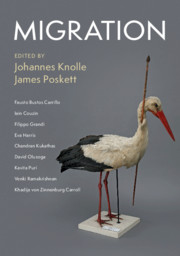Book contents
- Migration
- The Darwin College Lectures
- Migration
- Copyright page
- Contents
- Figures
- Notes on Contributors
- Acknowledgements
- Introduction
- 1 Black and British Migration
- 2 Immigration and Freedom
- 3 Art and Migration
- 4 Refugees and Migration
- 5 Migration of Disease
- 6 The Partition of India and Migration
- 7 Migration in Science
- 8 Animal Migration
- Index
- References
7 - Migration in Science
Published online by Cambridge University Press: 25 March 2020
- Migration
- The Darwin College Lectures
- Migration
- Copyright page
- Contents
- Figures
- Notes on Contributors
- Acknowledgements
- Introduction
- 1 Black and British Migration
- 2 Immigration and Freedom
- 3 Art and Migration
- 4 Refugees and Migration
- 5 Migration of Disease
- 6 The Partition of India and Migration
- 7 Migration in Science
- 8 Animal Migration
- Index
- References
Summary
Science is an international endeavour. Its development depends on exchanges of ideas and expertise, which are made possible by people moving from one part of the world to another. I myself am an immigrant at least twice over. I grew up in India and studied in the United States, spending almost three decades there before moving again to England almost 19 years ago to work at the Medical Research Council (MRC) Laboratory of Molecular Biology (LMB) in Cambridge. I was not the first immigrant to arrive there. In fact, the first three directors of the LMB were all immigrants. The first director, Max Perutz (1914–2002), was Austrian. The second, Sydney Brenner (1927–2019), and the third, Aaron Klug (1926–2018), were both South Africans. The current director, Jan Löwe, is also an immigrant, from Germany.
- Type
- Chapter
- Information
- Migration , pp. 148 - 165Publisher: Cambridge University PressPrint publication year: 2020
References
Further Reading
- 1
- Cited by

